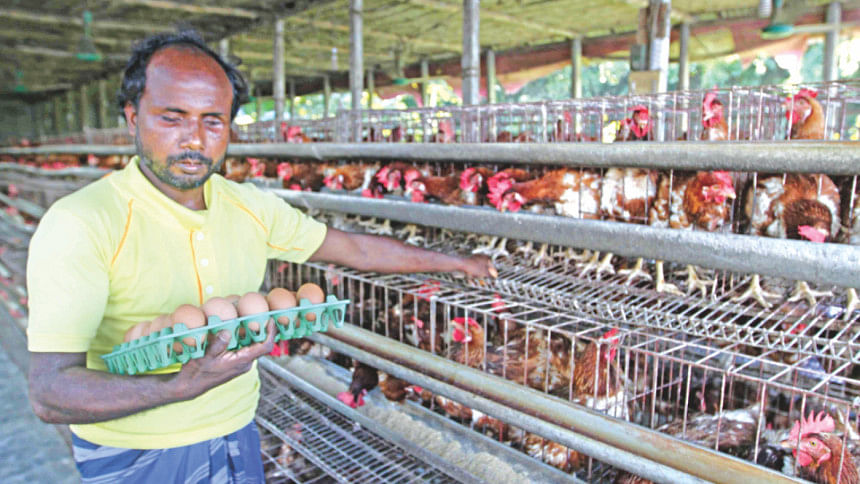A doer has no barrier

For many a blind son, life's destiny proves to be living a mostly unproductive life in the care of relatives. But Masud Miah, 35, from Mongholhor village in Tangail's Delduar upazila, through determination and persistence has proved that blindness is no obstacle to independence and success.
When Masud lost his eyesight at two years of age to typhoid, his father Samad Miah, a simple trader, made every effort to pursue treatment. After consulting local doctors, he took his son to hospitals in Mymensingh and Dhaka in the hope of restoring his son's sight. Unfortunately, efforts proved to be in vain.
“I tried my best to restore my son's eyesight,” says Samad, “I failed. I spent Tk 5 lakh for his treatment back then, and sold my only land to fund it.”
With Masud's blindness proving permanent, the young boy passed childhood nearby the house, largely in his own world. “I was so busy looking after our other three children and running the house,” says his mother Masuma Akter. “I worry I couldn't give Masud all the attention he needed.”
In 1992 when aged 11, Masud was admitted in class one at Tangail town's Vivekananda School. Using Braille texts, he studied to class six, living courtesy of the social welfare department at the school's hostel. “Actually, I didn't feel comfortable in my studies there,” he recalls.
What followed were sullen days at home, frustrated in knowing his father's hardship in bearing all expenses for the six-member family. “Eventually I decided I must do something for the family,” says Masud.
Some days later he sought admission at a training centre for people with disabilities in Gazipur's Tongi, where for six months he studied handicrafts. This too did not satisfy Masud.
“I returned home,” he remembers, “but I was determined not to sit idle. I started cattle rearing and set up a small shop in front of our village school.”
He also started to assist with his father's ploughing work. Masud proved good at starting their mini-tractor's engine, which his father found difficult due to weak hands. He learnt to supply oil and collected payment for their services door to door.
In 2006, Masud married Rekha Begum from Natore's Boraigram. A year later their daughter Arpa was born. “After marriage,” Masud says, “our family expenses increased. I needed a better income.”
To begin with, he sold all his cattle and took a loan from neighbours to send his younger brother Sohel Rana to Saudi Arabia. For the next few years remittances from Sohel supported the family; and Sohel sent extra money in the hope Masud might be able to pay for a transplant for one of his eyes. But Masud couldn't think of it.
Rather, Masud used the money to establish a poultry farm, his current business. By 2010, he had 1,500 hens. Though Masud employed a youth to help, much of the work including feeding, collecting eggs and vaccinations he did himself. But the road wasn't easy.
For the first two years the farm incurred losses, primarily due to the deaths of chickens to bird flu. Instead of giving up Masud tried harder. By the third year he made a profit, a trend that has continued. Nowadays, Masud realises Tk 1 to 1.5 lakh per month from his poultry farm.
It's sufficient income that he can send Tk 10,000 per month to help his younger sister Salma, a widow who lives with her daughter in Tangail town.
According to neighbour, vegetable farmer Mir Kabir, it's not only his sister Salma who Masud helps. “Many villagers go to Masud,” he says, “to borrow money in a crisis. As far as I know, he didn't refuse any of them.”
Local school teacher Rezaul Karim is likewise impressed. “Most blind people live as a burden to their families,” he says, “Masud is exceptional. The winning story of his life struggle can inspire others.”
“I have no regrets about my blindness,” says Masud. “I do have two dreams: the first is to educate my daughter, who currently studies in class IV. The second is to establish a big dairy farm.”
“I harbour no sorrow about my husband's blindness,” says his wife Rekha. “He manages everything the same as anybody. And he loves me and our daughter.”
Masud's advice to others with a disability is to try to do something to be self-dependent, rather than sitting idly to be cared for by others.

 For all latest news, follow The Daily Star's Google News channel.
For all latest news, follow The Daily Star's Google News channel. 



Comments